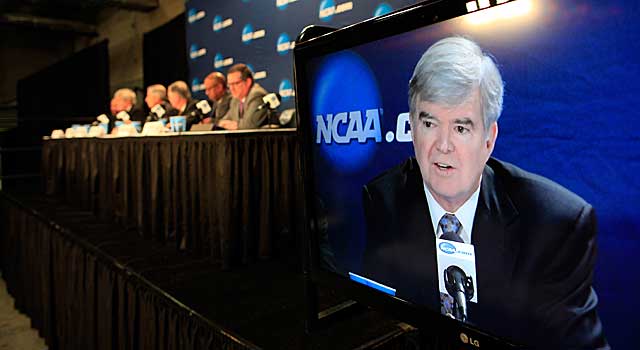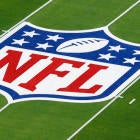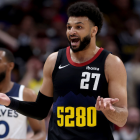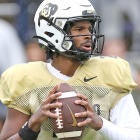
More: Emmert: Union 'grossly inappropriate' | Antitrust suit looms
ARLINGTON, Texas -- In the first five minutes, Bob Bowlsby sounded like the next NCAA president.
That's not necessarily a good thing for Mark Emmert, Bowlsby or his current employer, the Big 12. Bowlsby has it practically cushy as commissioner of FBS' smallest conference (10 teams) currently earning record revenues.
What does a former Iowa wrestler who "worked as hard as any football player in the country" need with taking over for Emmert, the current NCAA president?
No. 1, give the association some definition. Tweak the powers that be. Speak out.
In those first five minutes Sunday while participating in Emmert's annual Final Four presser, Bowlsby provided a clear, concise vision of the future.
"The weather will improve," he said as it stormed outside AT&T Stadium, "before we all go to see The Boss this afternoon."
Like the rest of us, Bowlsby wanted to conclude another snoozer of a press conference in time to see Bruce Springsteen take the stage Sunday night.
Yeah, it's about priorities. If you haven't noticed -- off the stage -- there's a war ahead that no sports network will televise. Forget about paying players or unions or enough lawsuits to suffocate Perry Mason.
The so-called low-resource schools, more or less those 286 below the BCS conference level are worried about being rubbed out by the big guys.
You don't have to be an economist to figure that money flows up. Coaches get paid $7 million a year from schools that produce $150 million annual revenue. Sooner or later the Bowling Greens of the world don't matter.
And perhaps they shouldn't. We are entering an age when a Kentucky guard making $5,000 a year may be bringing it up against an Eastern Kentucky guard making nothing beyond his scholarship.
Just don't call it cost of attendance. Call it paying players because those athletes would be rewarded financially for their athletic talents.
That's why those top 65 BCS schools know they could get along just fine without their smaller buddies. They could form their own division, or their own NCAA. Those 286 give the NCAA Tournament some of its Cinderella charm. They also drag down those top 65 schools -- the Big 12 among them -- who are about to run the NCAA.
"There are a number of points of differentiation between the 65 of and the rest of Division I ..." Bowlsby said. "There's stuff we've tried to get done for years. It's an accumulation of frustration."
The new voting structure is called autonomy. By August, those 65 will be able to decide if every scholarship player drives a Rolls Royce or gets a gold-plated toilet. That won't happen, of course. There is a balance to be struck.
A balance between tolerating the 286 and still keeping an educational component to the NCAA.
Bowlsby is all for that component without blowing smoke up your backside.
In those first five minutes Sunday he advocated:
• Replacing in-school recruiting visits with chats via FaceTime and Skype. He noted quite accurately that the NCAA recruiting model hasn't changed in the past 40 years.
• Single-semester sports. In this case Bowlsby was speaking directly to basketball, the season of which is way too long and way too meaningless.
"Some of our TV partners would be apoplectic to actually think about such things," he said.
• Calling the NCAA an organization "that really doesn't serve anybody's interests or needs."
Bowlsby is on record in the past as saying he'd overhaul the controversial NCAA enforcement division. On Sunday, he advocated tying graduation limits to revenue bonuses.
Graduate 80 percent of your players, maybe you get a couple of million more in revenue distribution from the NCAA.
You're wondering why players are thinking of unionizing or lawyers have been able to portray the NCAA as Big Tobacco? Harken back to Bowlsby's claim that the recruiting rules haven't changed much in 40 years.
If there were a more-streamlined NCAA, the O'Bannon lawsuit never would have happened. The NCAA didn't hire a chief medical officer until 15 months ago. More proactivity might have stiff-armed those concussion lawsuits.
Instead we're left with the snack debate. A few years ago, those high-resource schools wanted to offer snacks to athletes between training table meals. The lower-resource schools saw it as an added expense.
The compromise was that bagels could be served, but no cream cheese. Ridiculous, right?
Another quick story: One BCS conference official proposed a $55 per day per diem for players at bowl games. During the legislative process, the lower-resource schools balked. So that BCS administrator compromised, going backwards in increments of $5, sort of like an auction in reverse. Finally, he was bargaining dollar by dollar.
The biggie, of course, is the player stipend approved by presidents 2½ years ago. The measure was overridden by those smaller schools.
A war was on.
All of this, of course, is beyond silly. Trust is waning. The Bowling Greens and Idahos of the world sense they're being elbowed out of the highest level of NCAA. The BCS schools just want to make common-sense changes.
The threat that those schools may eventually leave the NCAA is a discussion for 10, 20 years down the line. Did you see the ratings for Saturday's games -- a new cable TV record?
Mercer was a part of those ratings.
The two sides need each other, for now. The fact that they can't get together on some simple points makes the NCAA "a three-legged camel," Bowlsby said.
"It's time to act," Emmert said.
"It certainly creates an imperative," Bowlsby said.
But when and how quickly? A new governance structure should be in place by August. But the NCAA may have lost O'Bannon by then. The possible payout could cripple college athletics.
Emmert oversees the NCAA. Bowlsby sounds like the next logical replacement.
"I'm worried about keeping the job I have," he said.
It's probably better than the one he could have in Indianapolis.




















